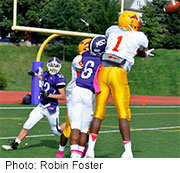- Could Your Grocery Store Meat Be Causing Recurring UTIs?
- Are You Making This Expensive Thermostat Error This Winter?
- Recognizing the Signs of Hypothyroidism
- 10 Strategies to Overcome Insomnia
- Could Artificial Sweeteners Be Aging the Brain Faster?
- Techniques for Soothing Your Nervous System
- Does the Water in Your House Smell Funny? Here’s Why
- Can a Daily Dose of Apple Cider Vinegar Actually Aid Weight Loss?
- 6 Health Beverages That Can Actually Spike Your Blood Sugar
- Treatment Options for Social Anxiety Disorder
Middle School Football Doesn’t Seem to Cause Short-Term Brain Damage: Study


Children who play football in middle school don’t appear to have any noticeable short-term brain damage from repeated hits to the head, new research suggests.
However, one doctor with expertise in pediatric brain injuries expressed some concerns about the study, saying its small size made it hard to draw definitive conclusions.
The study included 22 children, ages 11 to 13, who played a season of football. The season comprised 27 practices and nine games. During that time, more than 6,000 “head impacts” were recorded. They were similar in force and location to those experienced by high school and college players, but happened less often, the researchers found.
“The primary difference between head impacts experienced by middle school and high school football players is the number of impacts, not the force of the impacts,” said lead researcher Thayne Munce, associate director of the Sanford Sports Science Institute in Sioux Falls, S.D.
A season of football did not seem to clinically impair the brain function of middle school football players, even among those who got hit in the head harder and more often, Munce said.
“These findings are encouraging for youth football players and their parents, though the long-term effects of youth football participation on brain health are still unknown,” he said.
The report was published online recently in the journal Medicine & Science in Sports & Exercise.
For the study, players wore sensors in their helmets that measured the frequency of hits to the head, their location and force. In addition, the kids were screened before and after the season for factors such as balance, reading speed, reaction time and self-reported symptoms.
The average number of head hits per practice was nine. During games, the number of head hits was 12, according to the study. Over a season, that worked out to approximately 250 hits to the head, the researchers noted.
One child suffered a concussion during the study. He wasn’t cleared to play again until the 27th day after his concussion, according to the study.
Dr. John Kuluz, director of traumatic brain injury and neurorehabilitation at Miami Children’s Hospital, called it “alarming that kids are being hit with high impacts. The idea that younger kids don’t hit as hard is clearly not true.”
He said one problem with the study was its small size. The study authors concluded that the players didn’t suffer short-term brain damage. But Kuluz, who wasn’t part of the study, noted that the one child who had a concussion didn’t return to the team for a couple of weeks.
Kuluz said younger children’s brains are more pliable and heal faster than older children. Even with symptoms such as vomiting and forgetfulness after a head injury, younger kids recover faster than older children do, he said.
Despite the danger of head injuries, Kuluz thinks children should be allowed to play football and other contact sports.
“The benefits of sports participation in terms of heart health and general conditioning and the social benefit and teamwork are a great thing,” he said.
But, Kuluz added, a lot remains unknown about head injuries in young children. “We need a study that includes a lot more kids than this,” he said.
Parents should talk with their children about concussions, Kuluz said. “Children should not play if they have had a concussion. Children should let an adult know when they think they have suffered a concussion. They should describe their symptoms and not keep playing because that is only going to make it worse,” he said.
More information
For more on concussion, visit the American Association of Neurological Surgeons.
Source: HealthDay
Copyright © 2026 HealthDay. All rights reserved.










